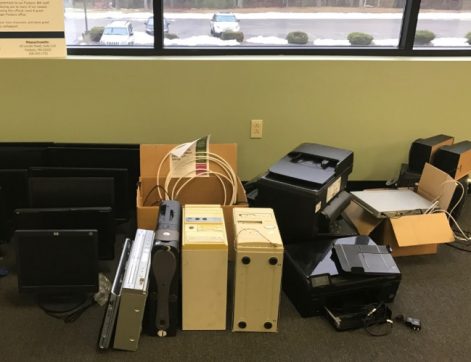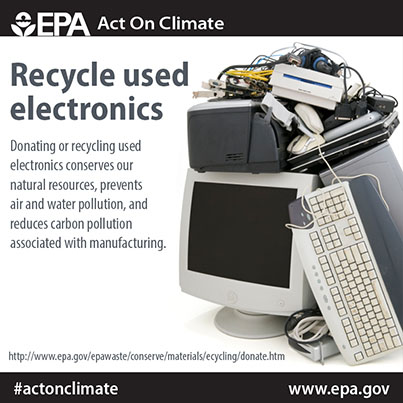Did You Know???
- “E-waste” (as electronic waste—anything with a battery or a cord—is frequently called) is the fastest growing waste stream in the world. It is quickly filling our landfills and it has the potential to do significantly more harm than household trash.
- The average lifespan of computers dropped from six years in 1997 to just two years by 2005, and cell phones have a life cycle of less than two years in developed countries.
- The United States discarded more than 11 million tons of e-waste in 2014 (the data for 2015 and 2016 hasn’t been released yet) but only approximately 20-25% of that waste is recycled each year.
- For every million cell phones we recycle, 35,000 pounds of copper, 772 pounds of silver, 75 pounds of gold, and 33 pounds of palladium can be recovered.
- Recycling one million laptops saves as much energy as the electricity used by more than 3,500 US homes in a year.
Electronics Recycling Drive
The Pare Sustainability Committee is sensitive to the environment and understands the need for reduction in landfill waste, so in March we organized an Electronics Recycling Drive for Pare employees. Through partnership with Northeast Computer Recycling (NECR, http://www.northeastcomputerrecycling.com/), we were able to recycle broken and obsolete electronics rather than putting them in mainstream waste channels. This year over 40 electronic items were collected including computer towers, monitors, printers, cell phones and various chargers. Thanks to everyone at Pare who supported this green initiative!
Ryan Lagace, owner and operator of NECR, explained that he was motivated to open NECR after witnessing companies throwing away a lot of old equipment when he worked in the IT industry. He had a vision to dismantle and recycle these items. Ryan explained, “100% of the material we take in is recycled, including plastics and metals. Everything is sorted out. I even found a local company to recycle polystyrene, and I get a lot of that from packaging.” NECR is staying busy with multiple pickups daily from businesses in MA and RI. Ryan’s advice about electronics recycling when asked was, “Reduce, Reuse, Recycle still rings true, but we don’t just recycle here. I try to re-sell equipment when I can so items have a second life instead of getting dismantled.”
In addition to diverting waste from landfills, there are two important reasons for recycling electronics. First, materials that make up electronics are valuable resources (metals, plastics and glass), all of which require energy to obtain and produce for electronics. Second, electronics contain many different toxic materials including lead, cadmium, mercury and arsenic. These items cause more potential harm to the environment than your typical household trash. Left sitting in landfills, these materials may leach into the soils and potentially into groundwater.
Everyone can help to reduce electronic waste; here are a few things to consider before making a purchase:
- Do you really need that new electronic device?
- Can you repair or upgrade components on the one you have?
- If your old electronic items are still working, consider re-selling them or donating them instead of throwing them out or recycling them.
Here are a few additional things you can do to reduce waste:
- Purchase items with rechargeable batteries.
- Look to purchase items from companies with “take back” programs.
- Look into refurbished electronics (save money and the earth).
- Purchase responsibly by using resources like Greenpeace to see what companies are the most environmentally conscience at http://www.greenpeace.org/international/en/campaigns/climate-change/cool-it/Campaign-analysis/Guide-to-Greener-Electronics/.
- Purchase items with the Energy Star Label.
- Look for items with the Restriction of Hazardous Substances Directive (RoHS) Logo.
To learn more about electronics recycling visit the US Environmental Protection Agency’s website at www.epa.gov/recycle/electronics-donation-and-recycling.




